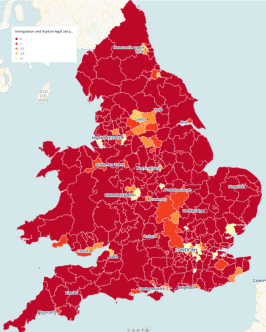Stranded in legal aid deserts: The crisis in UK asylum and immigration representation
Written by: Caroline Echwald

The term ‘legal aid desert’ refers to areas where there is a significant lack of legal aid services, leaving many individuals without access to the legal assistance they need. In the UK, this issue is particularly acute in asylum and immigration cases, where vulnerable individuals face substantial barriers to justice without adequate legal representation. This article explores the concept of legal aid deserts, the severe challenges faced by asylum seekers and migrants, and the urgent need for reform to ensure justice for all.
Understanding legal aid deserts
Legal aid deserts emerge when there is an insufficient number of solicitors or legal aid providers available to meet the demand for legal services in a particular region. Across England and Wales, 65% of the population has no access to an immigration and asylum legal aid provider. This scarcity means that individuals living in these areas, often the most vulnerable and marginalised, struggle to access the legal support they need to navigate complex legal systems. In the context of asylum and immigration, this can have dire consequences for individuals seeking to secure their rights and safety.
Asylum seekers and migrants are among the most vulnerable populations in the UK. Many often face language barriers, trauma from past experiences, and a lack of familiarity with the UK legal system in addition to precarious immigration status and being subject to hostile Home Office policies. Legal aid is crucial for these individuals to understand their rights, complete necessary paperwork, and present their cases effectively giving them a fair chance to make a successful application.
In legal aid deserts, the shortage of specialised legal professionals means that asylum seekers and migrants may have to travel long distances to find legal representation. This not only adds financial and logistical burdens but also delays the legal processes that are critical for their protection and stability. In addition, many of the law firms and organisations who provide specialised legal advice have limited capacity to take on cases leading to long waiting times due to ongoing funding cuts and unsustainable Legal aid fees. In many cases, the lack of timely legal assistance can lead to wrongful deportations, prolonged detentions, and the denial of asylum claims.
Moreover, access to legal aid is not only a matter of justice but also an economic benefit. Providing legal aid helps to prevent costly legal errors and lengthy court cases, which can save public funds. Ensuring that individuals receive proper legal representation early on can reduce the overall burden on the court system and lead to more efficient and fair outcomes, ultimately benefiting both the economy and individuals’ rights.
Causes of legal aid deserts
Several factors contribute to the creation of legal aid deserts in the UK:
Funding cuts: Substantial reductions in funding allocated to legal aid have compelled many legal aid providers to either scale back their operations or cease offering services altogether. This has disproportionately affected smaller firms and those situated in rural or economically disadvantaged areas.
Limited scope: Many cases have been removed from the scope of legal aid, among them immigration cases. This means that the types of cases that can be funded by legal aid has been significantly reduced. In addition to fee reductions, limiting the scope for legal aid is a contributing factor to the lack of available legal aid providers in these deserts.
Challenges with Legal Aid fees: The fees associated with legal aid work, particularly in immigration and asylum cases, have remained unchanged since 1996. Adjusted for inflation, this represents a significant decrease of 48%. Consequently, many legal professionals find it financially unfeasible to continue delivering these critical services.
Regulatory and administrative barriers: Demanding regulations and time-consuming bureaucratic procedures pose significant obstacles that discourage legal professionals, especially in specialised fields like immigration and asylum law, from engaging in legal aid services.
Geographical inequalities: There is a prominent discrepancy in the availability of legal aid services between urban and rural areas. Urban centres typically have a higher concentration of legal aid providers, whereas rural communities often encounter shortages, exacerbating the challenges faced by individuals seeking legal assistance in these regions.
Challenges in addressing legal aid deserts
Addressing the issue of legal aid deserts, especially in the context of asylum and immigration, involves several significant challenges. One of the primary challenges is restoring adequate funding to ensure the sustainability of legal aid services. Securing increased funding in a climate of austerity and budget cuts is no small feat. The current legal aid fees are so low that firms like Duncan Lewis solicitors report substantial annual losses, making it unsustainable to continue providing these essential services. This financial strain highlights the urgent need for increased and stable funding to support legal aid providers.
Another critical challenge is encouraging specialisation in asylum and immigration law. These areas require specialised knowledge and skills, and it is crucial to have more legal professionals entering this field and providing legal aid. However, this requires support through training and financial incentives. Without proper training and the promise of financial sustainability, it is difficult to attract and retain skilled lawyers in this essential area of law.
Improving accessibility to legal aid services is also a pressing issue. Innovative solutions, such as online legal services, and mobile legal aid clinics similar to those run by our civil society partners, can help bridge the gap in underserved areas. At Seraphus we engage in this method of practice for non-legal aid services exactly because they have the potential to bring legal advice directly to those who need it most, reducing the barriers of distance and transportation costs. We recognise however, that implementing these solutions requires significant investment and these approaches may be out of reach for many legal aid providers and some clients.
Comprehensive policy reforms are needed to address the bureaucratic obstacles that hinder legal aid providers. Simplifying application processes for legal aid funding and reducing regulatory burdens can facilitate the provision of services to those in need. Current regulations are often overly complex and time-consuming, deterring many legal professionals from engaging in legal aid work.
Instead, Legal aid lawyers should be trusted to deliver services to the required standard without excessive bureaucratic systems. They already undergo a rigorous tender process, continuous monitoring by Legal Aid Managers, and must adhere to professional regulatory requirements. These measures collectively ensure high-quality service and mitigate any perceived risks to clients as identified by the Legal Aid Agency.
High Court challenge
The gravity of the legal aid desert issue is underscored by the high court challenge brought by Duncan Lewis solicitors against the lord chancellor, currently Alex Chalk. This challenge highlights the government’s failure to raise the rates for “controlled work” in immigration and asylum cases, despite significant evidence of the devastating consequences of inadequate access to legal aid.
The situation has become so critical that the president of the Law Society, Nick Emmerson, has warned that the civil justice system is in a precarious state, with Jeremy Bloom of Duncan Lewis solicitors emphasising that continuing to take on work at current rates is unsustainable and that the losers in this scenario are the individuals who need representation the most to seek justice.
Last year, the government embarked on a major civil legal aid review, with a green paper expected to be published this summer. However, there are concerns that political factors may delay necessary reforms. The ongoing high court challenge and the anticipation of government action illustrate the urgency and complexity of addressing legal aid deserts.
Conclusion
Legal aid deserts present a severe challenge to the justice system in the UK, particularly for asylum seekers and migrants who rely on legal aid to navigate their complex legal situations. Addressing these challenges requires a manifold approach that addresses funding, specialisation, accessibility, and policy reform. By taking these steps, the UK can move towards a more just legal system where everyone, regardless of their location or background, has access to the legal support they need.
Furthermore, the imminent changes in government following the 4 July election offer a renewed opportunity for meaningful reform. We urge a new government to prioritise addressing the critical challenges in legal aid provision and take decisive action to ensure equitable access to justice for all. With a commitment to these reforms, the UK can create a fairer and more efficient legal system that better serves its most vulnerable populations.
Civil society partners
Learn more about our Civil Society partners working to make legal advice accessible to those who need it most.

